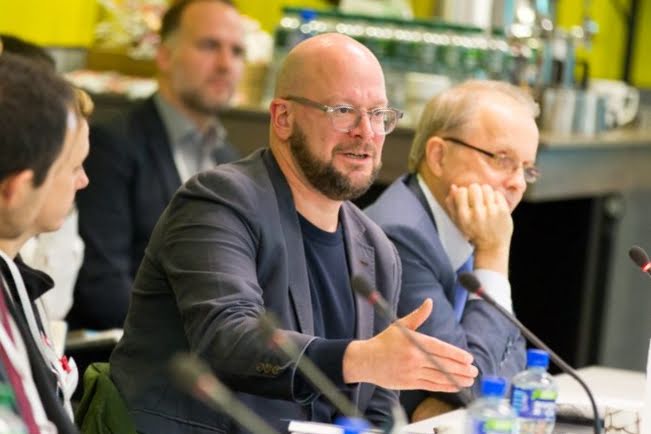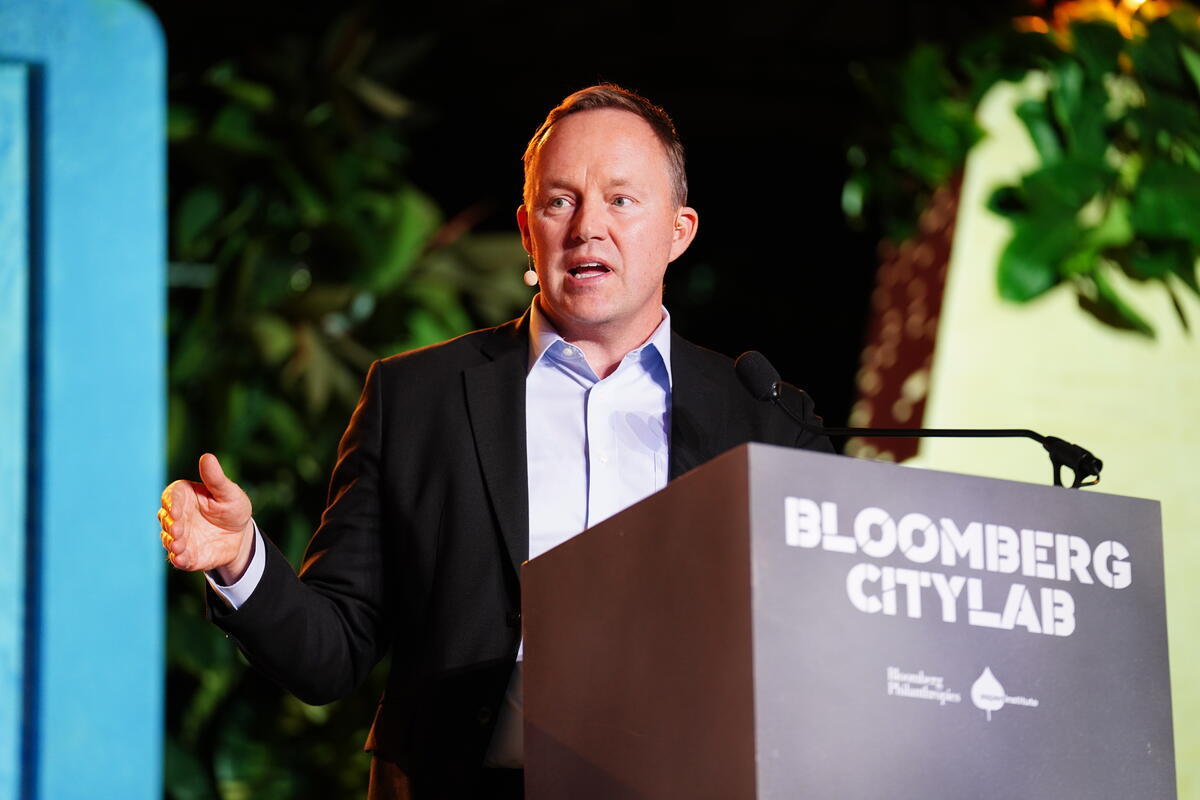
Photo: Cities Today
Open banking principles could unlock city data innovation, says London’s Chief Digital Officer
26 October 2023
by Sarah Wray
London’s Chief Digital Officer Theo Blackwell has called for action to support greater data-sharing between councils in the UK.
He said this could help to improve care provision, address the cost-of-living crisis, and achieve net-zero targets, and believes that data should be part of local government devolution discussions.
Updating national policies and laws and learning from adjacent areas such as open banking are key to enabling data collaboration in local government, he argues. This includes exploring the adaptation of open banking principles such as consent-based data sharing, standardised frameworks, APIs, and interoperability.
Introduced in 2017, open banking requires the UK’s largest banks to allow customers to share their financial data with authorised providers. It has been credited with driving competition, innovation, and transparency in retail banking, and benefiting millions of users through financial management apps and payment tools.
In a new blog post, Blackwell cites challenges that prevent local governments fully tapping into the vast amounts of data they process, such as entrenched legacy technology, and administrative and cultural barriers.
“Local government data, when linked, holds huge potential for positive change,” he says, noting that access to much larger pools of data and datasets allows for deeper analysis and understanding of complex issues that span councils or regions.
In addition to data on demographics and place, councils hold transaction data such as from school enrolments, social service records, waste collection, parking, transport and housing services.
“This data provides valuable insights into citizens’ needs, behaviours and preferences, allowing services to be tailored accordingly,” Blackwell says but notes that it is often “locked behind commercial, technology or administrative firewalls.”
Potential
He highlights several areas where combining local authority datasets, with the right privacy and security safeguards in place, could unlock benefits.
For example, sharing local authority data between councils could facilitate integrated care planning, predictive risk models, and more personalised care solutions.
It could further support cross-council collaboration on renewable energy projects, EV charging infrastructure and climate adaptation and resilience.
As the UK faces an ongoing cost-of-living crisis, sharing data on income, housing, energy consumption and food insecurity could help councils better support residents.
Blackwell also sees a big opportunity in combining NHS patient care records with information such as social, housing, and environmental data from local authorities to enable preventive healthcare measures.
An emerging example of what could be possible is the London Office of Technology and Innovation’s work using data from multiple sources to reduce homelessness.
Recommendations
Blackwell says: “Securing resources to deliver data collaboration is essential to moving beyond ad-hoc approaches and projects towards a systematic and sustained approach to local government data. Striking a balance between decentralised-yet-coordinated is the biggest challenge and where Open Banking in the financial sector is interesting to explore as a model.”
His recommendations for policymakers include a revision of the UK Government National Data Strategy to cover all levels of government, including local authorities.
“Create a framework that encourages efficient data-sharing and use among local authorities, fostering collaboration and innovation,” Blackwell says.
He calls for new laws that modernise data practices in local government and promote technological compatibility, and says that central government should allocate funding and resources to modernise data infrastructure in councils.
In addition, local authorities should be encouraged to explore and develop new operating or business models for service delivery, starting with pressing areas such as care, net-zero initiatives, and addressing the cost of living.
“By embracing these recommendations and recognising data as a fundamental element of devolution, local government can significantly improve the lives of citizens, deliver better services, and drive positive change at the community level,” Blackwell comments.
Key protection measures highlighted include data minimisation, consent-based sharing, and anonymisation techniques, as well as the use of Data Protection Impact Assessments and formal data-sharing agreements.
Smart data challenge
In a related initiative, a government-led coalition today put out an open call for ideas for solutions that could harness ‘smart data’ in sectors including transport, energy, retail, financial services, and home buying.
The Smart Data Discovery Challenge was launched by The Department for Business and Trade, Challenge Works, the Open Data Institute and Smart Data Foundry.
Inspired by open banking, the organisations say ‘smart data’ enables individuals and small businesses to access and share their data securely with authorised third parties, enabling innovative services.
The challenge, which is open until December 8, calls for ideas from individuals, entrepreneurs, academia and civil society and seeks proposals to address challenges like the cost of living, the transition to net zero and supporting vulnerable people.
Kevin Hollinrake, Minister for Enterprise, Markets and Small Business said: “Smart data has the potential to help create solutions to real life issues that consumers face on a daily basis as well as supporting small firms across the country and helping to grow the economy.”
The challenge will also consider other potential data that might be unlocked from other sectors, such as telecoms.
A statement said: “The most exciting contributions will be supported with mentorship and guidance and the best will be rewarded with cash prizes.” Participants will also help inform government thinking about smart data in the UK and help shape a potential Smart Data Prize in 2024.
Regulation
A spokesperson for the Smart Data Discovery Challenge told Cities Today that technical and legal changes would be needed to support ‘smart data’ schemes in more sectors.
“For Open Banking, the legal and technical mechanisms were set up using competition law powers held by the Competition and Markets Authority,” they said.
“The government is currently seeking powers to extend its ability to introduce smart data schemes in the Data Protection and Digital Information (No.2) Bill. This would enable government to introduce new Smart Data schemes in different sectors.”
The regulations will establish standards and rules around how data can be shared, accessed, and used, and give consumers options for redress if data is mishandled.
The spokesperson added: “The regulatory environment for smart data is in development and evolving fast – the findings of the Smart Data Discovery Challenge will influence the rules established to govern the safe and effective use of smart data in the UK.”






